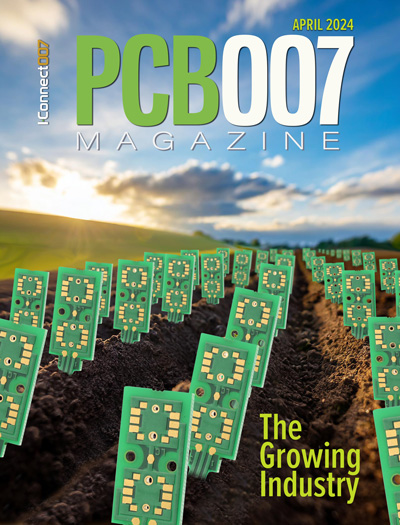-

- News
- Books
Featured Books
- pcb007 Magazine
Latest Issues
Current Issue
The Growing Industry
In this issue of PCB007 Magazine, we talk with leading economic experts, advocacy specialists in Washington, D.C., and PCB company leadership to get a well-rounded picture of what’s happening in the industry today. Don’t miss it.

The Sustainability Issue
Sustainability is one of the most widely used terms in business today, especially for electronics and manufacturing but what does it mean to you? We explore the environmental, business, and economic impacts.

The Fabricator’s Guide to IPC APEX EXPO
This issue previews many of the important events taking place at this year's show and highlights some changes and opportunities. So, buckle up. We are counting down to IPC APEX EXPO 2024.
- Articles
Article Highlights
- Columns
Search Console
- Links
- Events
||| MENU - pcb007 Magazine
Successful Onboarding Takes Training, Technique, and Trust
April 26, 2023 | I-Connect007 Editorial TeamEstimated reading time: 2 minutes
Many companies in our industry are trying to hire new career-minded, long-term employees, but the hiring process is costly, especially if you hire someone who doesn’t work out. How do you ensure that your new hire stays on and becomes a happy, long-time employee?
We recently spoke with Ventec’s Frank Lorentz about his company’s onboarding processes. Frank is the general manager of Ventec’s customer and technical service, warehouse, and quick-turn facility in Germany, and he’s made a career out of logistics. He walks us through his exhaustive onboarding process, which includes letting new hires make mistakes so that they can learn from them. He also discusses why company culture matters, the need for trust between managers and staff, and why managers must remember that they’re dealing with human beings, not machines.
Barry Matties: Frank, let’s start with an overview of your onboarding process.
Frank Lorentz: We have different grades of onboarding. If it’s a shop floor person or a supply chain manager, for example, it’s a little bit different. It doesn’t matter if you work on the shop floor or in the office, you have to understand the ERP system. Therefore, we have a really detailed checklist, and this is point one. We get straight to work on the first day new employees come in. After a tour of our facility to meet the entire team, they get their checklist, and start with the training.
Everybody is assigned a mentor, an experienced employee who has been with us for a while. Then you’re put to work immediately and, during that time, you get a deep understanding of our processes, which is the most important thing. It goes without saying that you must know how to correctly use the ERP system and the tools required for your job, but understanding all our processes is the most important thing. That’s the secret.
How does Ventec Germany operate? We use an efficient and effective job-card system, so it’s essential to know where job cards originate from and what purpose they have. What happens with a job card when you are working on the shop floor, in the office, or once you’ve added your information to it? First, you must understand the whole process to work effectively within our system. This is the basis of everything. If you understand the process, then you are free to work within that process, because you get everyone’s full trust and you are allowed to make mistakes.
To read this entire article, which appeared in the April 2023 issue of PCB007 Magazine, click here.
Suggested Items
Cadence, TSMC Collaborate on Wide-Ranging Innovations to Transform System and Semiconductor Design
04/25/2024 | Cadence Design SystemsCadence Design Systems, Inc. and TSMC have extended their longstanding collaboration by announcing a broad range of innovative technology advancements to accelerate design, including developments ranging from 3D-IC and advanced process nodes to design IP and photonics.
Siemens’ Breakthrough Veloce CS Transforms Emulation and Prototyping with Three Novel Products
04/24/2024 | Siemens Digital Industries SoftwareSiemens Digital Industries Software launched the Veloce™ CS hardware-assisted verification and validation system. In a first for the EDA (Electronic Design Automation) industry, Veloce CS incorporates hardware emulation, enterprise prototyping and software prototyping and is built on two highly advanced integrated circuits (ICs) – Siemens’ new, purpose-built Crystal accelerator chip for emulation and the AMD Versal™ Premium VP1902 FPGA adaptive SoC (System-on-a-chip) for enterprise and software prototyping.
Taiyo Circuit Automation Installs New DP3500 into Fuba Printed Circuits, Tunisia
04/25/2024 | Taiyo Circuit AutomationTaiyo Circuit Automation is proud to be partnered with Fuba Printed Circuits, Tunisia part of the OneTech Group of companies, a leading printed circuit board manufacturer based out of Bizerte, Tunisia, on their first installation of Taiyo Circuit Automation DP3500 coater.
Vicor Power Orders Hentec Industries/RPS Automation Pulsar Solderability Testing System
04/24/2024 | Hentec Industries/RPS AutomationHentec Industries/RPS Automation, a leading manufacturer of selective soldering, lead tinning and solderability test equipment, is pleased to announce that Vicor Power has finalized the purchase of a Pulsar solderability testing system.
Lockheed Martin Successfully Transitions Long Range Discrimination Radar To The Missile Defense Agency
04/23/2024 | Lockheed MartinThe Long Range Discrimination Radar (LRDR) at Clear Space Force Station in Clear, Alaska, completed DD250 final acceptance and was officially handed over to the Missile Defense Agency in preparation for an Operational Capability Baseline (OCB) decision and final transition to the Warfighter. In addition, prior to this transition, the system has started Space Domain Awareness data collects for the United States Space Force.


